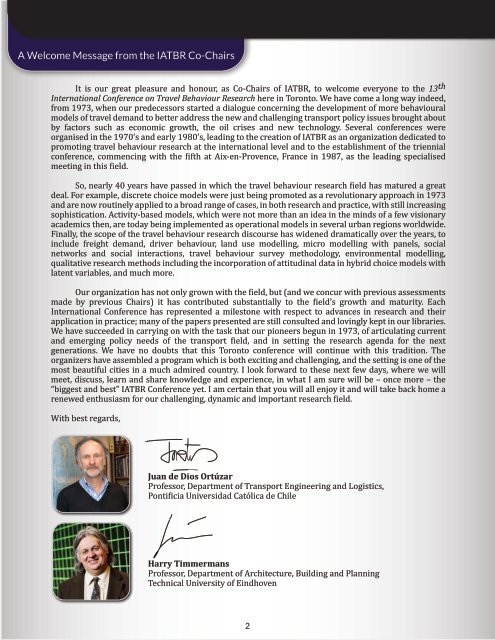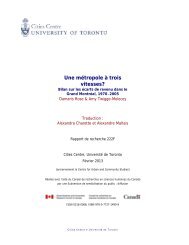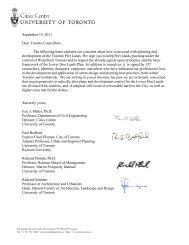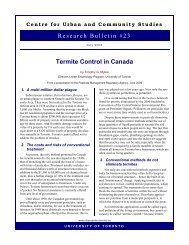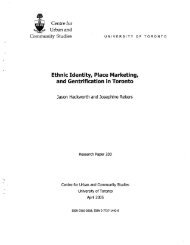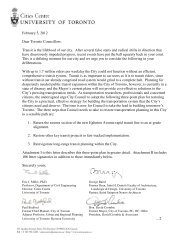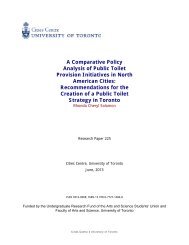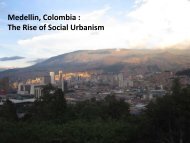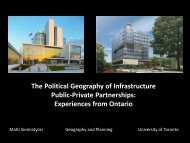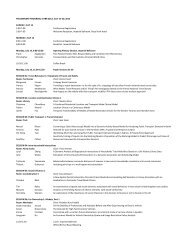Program - Cities Centre - University of Toronto
Program - Cities Centre - University of Toronto
Program - Cities Centre - University of Toronto
- No tags were found...
You also want an ePaper? Increase the reach of your titles
YUMPU automatically turns print PDFs into web optimized ePapers that Google loves.
A Welcome Message from the IATBR Co-ChairsIt is our great pleasure and honour, as Co-Chairs <strong>of</strong> IATBR, to welcome everyone to the 13 thInternational Conference on Travel Behaviour Research here in <strong>Toronto</strong>. We have come a long way indeed,from 1973, when our predecessors started a dialogue concerning the development <strong>of</strong> more behaviouralmodels <strong>of</strong> travel demand to better address the new and challenging transport policy issues brought aboutby factors such as economic growth, the oil crises and new technology. Several conferences wereorganised in the 1970’s and early 1980’s, leading to the creation <strong>of</strong> IATBR as an organization dedicated topromoting travel behaviour research at the international level and to the establishment <strong>of</strong> the triennialconference, commencing with the ifth at Aix-en-Provence, France in 1987, as the leading specialisedmeeting in this ield.So, nearly 40 years have passed in which the travel behaviour research ield has matured a greatdeal. For example, discrete choice models were just being promoted as a revolutionary approach in 1973and are now routinely applied to a broad range <strong>of</strong> cases, in both research and practice, with still increasingsophistication. Activity-based models, which were not more than an idea in the minds <strong>of</strong> a few visionaryacademics then, are today being implemented as operational models in several urban regions worldwide.Finally, the scope <strong>of</strong> the travel behaviour research discourse has widened dramatically over the years, toinclude freight demand, driver behaviour, land use modelling, micro modelling with panels, socialnetworks and social interactions, travel behaviour survey methodology, environmental modelling,qualitative research methods including the incorporation <strong>of</strong> attitudinal data in hybrid choice models withlatent variables, and much more.Our organization has not only grown with the ield, but (and we concur with previous assessmentsmade by previous Chairs) it has contributed substantially to the ield’s growth and maturity. EachInternational Conference has represented a milestone with respect to advances in research and theirapplication in practice; many <strong>of</strong> the papers presented are still consulted and lovingly kept in our libraries.We have succeeded in carrying on with the task that our pioneers begun in 1973, <strong>of</strong> articulating currentand emerging policy needs <strong>of</strong> the transport ield, and in setting the research agenda for the nextgenerations. We have no doubts that this <strong>Toronto</strong> conference will continue with this tradition. Theorganizers have assembled a program which is both exciting and challenging, and the setting is one <strong>of</strong> themost beautiful cities in a much admired country. I look forward to these next few days, where we willmeet, discuss, learn and share knowledge and experience, in what I am sure will be – once more – the“biggest and best” IATBR Conference yet. I am certain that you will all enjoy it and will take back home arenewed enthusiasm for our challenging, dynamic and important research ield.With best regards,Juan de Dios OrtúzarPr<strong>of</strong>essor, Department <strong>of</strong> Transport Engineering and Logistics,Pontiicia Universidad Católica de ChileHarry TimmermansPr<strong>of</strong>essor, Department <strong>of</strong> Architecture, Building and PlanningTechnical <strong>University</strong> <strong>of</strong> Eindhoven2


